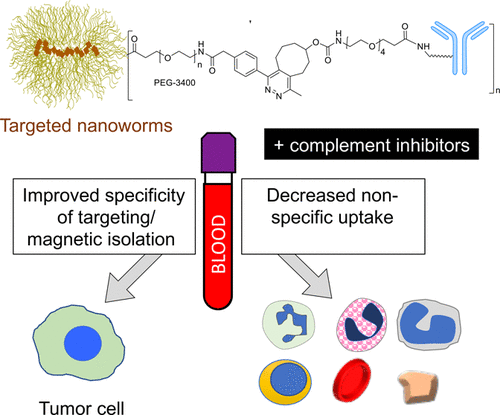当前位置:
X-MOL 学术
›
Bioconjugate Chem.
›
论文详情
Our official English website, www.x-mol.net, welcomes your
feedback! (Note: you will need to create a separate account there.)
Complement Inhibitors Block Complement C3 Opsonization and Improve Targeting Selectivity of Nanoparticles in Blood.
Bioconjugate Chemistry ( IF 4.0 ) Pub Date : 2020-06-29 , DOI: 10.1021/acs.bioconjchem.0c00342 Hanmant Gaikwad , Yue Li , Geoffrey Gifford , Ernest Groman , Nirmal K Banda 1 , Laura Saba , Robert Scheinman , Guankui Wang , Dmitri Simberg
Bioconjugate Chemistry ( IF 4.0 ) Pub Date : 2020-06-29 , DOI: 10.1021/acs.bioconjchem.0c00342 Hanmant Gaikwad , Yue Li , Geoffrey Gifford , Ernest Groman , Nirmal K Banda 1 , Laura Saba , Robert Scheinman , Guankui Wang , Dmitri Simberg
Affiliation

|
Complement is one of the critical branches of innate immunity that determines the recognition of engineered nanoparticles by immune cells. Antibody-targeted iron oxide nanoparticles are a popular platform for magnetic separations, in vitro diagnostics, and molecular imaging. We used 60 nm cross-linked iron oxide nanoworms (CLIO NWs) modified with antibodies against Her2/neu and EpCAM, which are common markers of blood-borne cancer cells, to understand the role of complement in the selectivity of targeting of tumor cells in whole blood. CLIO NWs showed highly efficient targeting and magnetic isolation of tumor cells spiked in lepirudin-anticoagulated blood, but specificity was low due to high uptake by neutrophils, monocytes, and lymphocytes. Complement C3 opsonization in plasma was predominantly via the alternative pathway regardless of the presence of antibody, PEG, or fluorescent tag, but was higher for antibody-conjugated CLIO NWs. Addition of various soluble inhibitors of complement convertase (compstatin, soluble CD35, and soluble CD55) to whole human blood blocked up to 99% of the uptake of targeted CLIO NWs by leukocytes, which resulted in a more selective magnetic isolation of tumor cells. Using well-characterized nanomaterials, we demonstrate here that complement therapeutics can be used to improve targeting selectivity.
中文翻译:

补体抑制剂阻断补体 C3 调理作用并提高血液中纳米颗粒的靶向选择性。
补体是先天免疫的关键分支之一,它决定了免疫细胞对工程纳米粒子的识别。抗体靶向氧化铁纳米粒子是磁分离、体外诊断和分子成像的流行平台。我们使用了 60 nm 交联氧化铁纳米蠕虫 (CLIO NWs),用抗 Her2/neu 和 EpCAM 的抗体修饰,这些抗体是血源性癌细胞的常见标志物,以了解补体在靶向肿瘤细胞的选择性中的作用全血。CLIO NW 显示出对加入来匹卢定抗凝血液中的肿瘤细胞的高效靶向和磁性分离,但由于中性粒细胞、单核细胞和淋巴细胞的高摄取,特异性较低。无论是否存在抗体、PEG 或荧光标签,血浆中的补体 C3 调理主要通过替代途径,但对于抗体偶联的 CLIO NWs 更高。将补体转化酶的各种可溶性抑制剂(坎普他汀、可溶性 CD35 和可溶性 CD55)添加到全人血中,可阻止白细胞对靶向 CLIO NW 的吸收高达 99%,从而对肿瘤细胞进行更具选择性的磁分离。使用充分表征的纳米材料,我们在此证明补体疗法可用于提高靶向选择性。和可溶性 CD55) 对全人血的抑制高达 99% 的白细胞对靶向 CLIO NW 的吸收,这导致对肿瘤细胞的更具选择性的磁隔离。使用充分表征的纳米材料,我们在此证明补体疗法可用于提高靶向选择性。和可溶性 CD55) 对全人血的抑制高达 99% 的白细胞对靶向 CLIO NW 的吸收,这导致对肿瘤细胞的更具选择性的磁隔离。使用充分表征的纳米材料,我们在此证明补体疗法可用于提高靶向选择性。
更新日期:2020-07-15
中文翻译:

补体抑制剂阻断补体 C3 调理作用并提高血液中纳米颗粒的靶向选择性。
补体是先天免疫的关键分支之一,它决定了免疫细胞对工程纳米粒子的识别。抗体靶向氧化铁纳米粒子是磁分离、体外诊断和分子成像的流行平台。我们使用了 60 nm 交联氧化铁纳米蠕虫 (CLIO NWs),用抗 Her2/neu 和 EpCAM 的抗体修饰,这些抗体是血源性癌细胞的常见标志物,以了解补体在靶向肿瘤细胞的选择性中的作用全血。CLIO NW 显示出对加入来匹卢定抗凝血液中的肿瘤细胞的高效靶向和磁性分离,但由于中性粒细胞、单核细胞和淋巴细胞的高摄取,特异性较低。无论是否存在抗体、PEG 或荧光标签,血浆中的补体 C3 调理主要通过替代途径,但对于抗体偶联的 CLIO NWs 更高。将补体转化酶的各种可溶性抑制剂(坎普他汀、可溶性 CD35 和可溶性 CD55)添加到全人血中,可阻止白细胞对靶向 CLIO NW 的吸收高达 99%,从而对肿瘤细胞进行更具选择性的磁分离。使用充分表征的纳米材料,我们在此证明补体疗法可用于提高靶向选择性。和可溶性 CD55) 对全人血的抑制高达 99% 的白细胞对靶向 CLIO NW 的吸收,这导致对肿瘤细胞的更具选择性的磁隔离。使用充分表征的纳米材料,我们在此证明补体疗法可用于提高靶向选择性。和可溶性 CD55) 对全人血的抑制高达 99% 的白细胞对靶向 CLIO NW 的吸收,这导致对肿瘤细胞的更具选择性的磁隔离。使用充分表征的纳米材料,我们在此证明补体疗法可用于提高靶向选择性。











































 京公网安备 11010802027423号
京公网安备 11010802027423号